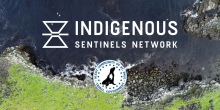The Indigenous Sentinels Network is a tool for recording and communicating significant environmental and ecological events in order to empower remote communities dealing with the effects of climate change (i.e., environmental declines, economic disruptions for both subsistence and cash economies, loss of cultural knowledge, etc.). ISN uses the approach of an internet-based system (i.e., online database, smartphone or template apps, etc.) that enables communities across Alaska and beyond to implement rigorous monitoring programs while utilizing ISN’s well-refined environmental database.
The ISN network is rooted in both Traditional Ecological Knowledge and Western scientific methods. We recognize the diversity of qualitative and quantitative data that are valuable in decision-making processes (conservation, policy, management), especially in a rapidly changing environment. Our goal is to provide remote, indigenous communities with tools, training, networking and convening, coordination, and capacity for ecological, environmental, and climate monitoring.
The strength of ISN is that it is a tribally-owned program designed for and used by Indigenous participants, who are inherently diverse and historically underrepresented in technology-based initiatives. Often, Alaskan communities are isolated and limited in technology (e.g., internet speed and cell service), yet they have a collective body of diverse knowledge and data that has been amassed over generations.
Project Location
Website
Indigeneous Sentinels Network WebsiteLocation
Aleut Community of St. Paul IslandMembers
Project Contact
ISN Coordinator at Aleut Community of St. Paul Island
Network Program Officer, Northern Latitudes Partnerships, Alaska Conservation Foundation


